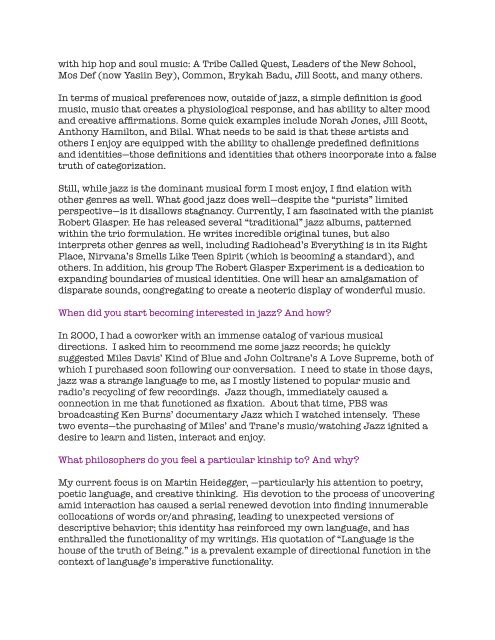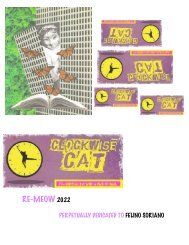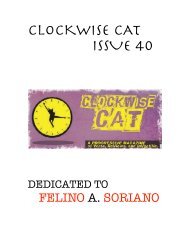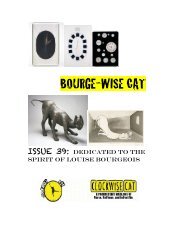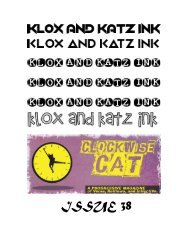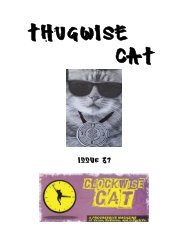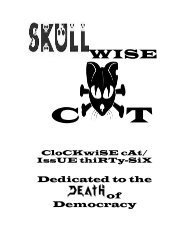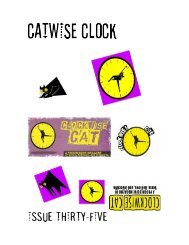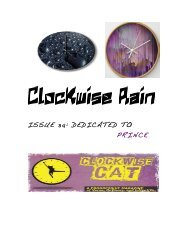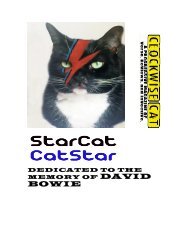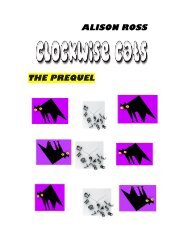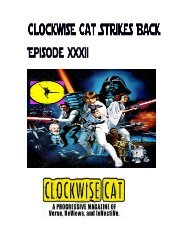Felino Soriano Tribute
You also want an ePaper? Increase the reach of your titles
YUMPU automatically turns print PDFs into web optimized ePapers that Google loves.
with hip hop and soul music: A Tribe Called Quest, Leaders of the New School,<br />
Mos Def (now Yasiin Bey), Common, Erykah Badu, Jill Scott, and many others.<br />
In terms of musical preferences now, outside of jazz, a simple definition is good<br />
music, music that creates a physiological response, and has ability to alter mood<br />
and creative affirmations. Some quick examples include Norah Jones, Jill Scott,<br />
Anthony Hamilton, and Bilal. What needs to be said is that these artists and<br />
others I enjoy are equipped with the ability to challenge predefined definitions<br />
and identities—those definitions and identities that others incorporate into a false<br />
truth of categorization.<br />
Still, while jazz is the dominant musical form I most enjoy, I find elation with<br />
other genres as well. What good jazz does well—despite the “purists” limited<br />
perspective—is it disallows stagnancy. Currently, I am fascinated with the pianist<br />
Robert Glasper. He has released several “traditional” jazz albums, patterned<br />
within the trio formulation. He writes incredible original tunes, but also<br />
interprets other genres as well, including Radiohead’s Everything is in its Right<br />
Place, Nirvana’s Smells Like Teen Spirit (which is becoming a standard), and<br />
others. In addition, his group The Robert Glasper Experiment is a dedication to<br />
expanding boundaries of musical identities. One will hear an amalgamation of<br />
disparate sounds, congregating to create a neoteric display of wonderful music.<br />
When did you start becoming interested in jazz? And how?<br />
In 2000, I had a coworker with an immense catalog of various musical<br />
directions. I asked him to recommend me some jazz records; he quickly<br />
suggested Miles Davis’ Kind of Blue and John Coltrane’s A Love Supreme, both of<br />
which I purchased soon following our conversation. I need to state in those days,<br />
jazz was a strange language to me, as I mostly listened to popular music and<br />
radio’s recycling of few recordings. Jazz though, immediately caused a<br />
connection in me that functioned as fixation. About that time, PBS was<br />
broadcasting Ken Burns’ documentary Jazz which I watched intensely. These<br />
two events—the purchasing of Miles’ and Trane’s music/watching Jazz ignited a<br />
desire to learn and listen, interact and enjoy.<br />
What philosophers do you feel a particular kinship to? And why?<br />
My current focus is on Martin Heidegger, —particularly his attention to poetry,<br />
poetic language, and creative thinking. His devotion to the process of uncovering<br />
amid interaction has caused a serial renewed devotion into finding innumerable<br />
collocations of words or/and phrasing, leading to unexpected versions of<br />
descriptive behavior; this identity has reinforced my own language, and has<br />
enthralled the functionality of my writings. His quotation of “Language is the<br />
house of the truth of Being.” is a prevalent example of directional function in the<br />
context of language’s imperative functionality.


